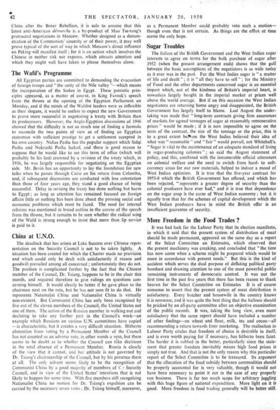China at U.N.O.
The deadlock that has arisen at Lake Success over Chinese repre- sentation on the Security Council is not to be taken lightly. A situation has been created for which the Charter made no provision and which could only be dealt with satisfactorily if reason and goodwill prevailed among all concerned ; unfortunately they do not. The position is complicated further by the fact that the Chinese member of the Council, Dr. Tsiang, happens to be in the chair this month, and required therefore to give rulings on questions con- cerning himself. It would clearly be better if he gave place to the chairman next on the rota, but he has not seen fit to do that. He represents Nationalist China and Nationalist China is virtually non-existent. But Communist China has only been recognised by five out of the eleven members of the Council, the United States not one of them. The action of the Russian member in walking nut and declining to take any further part in the Council's work—an example which Russians on various U.N. committees have copied —is characteristic, but it creates a very difficult situation. Hitherto abstention from voting by a Permanent Member of the Council has not counted as an adverse vote, in other words a veto, but there seems to be doubt as to whether the Council can take decisions in the total absence of a Permanent Member. Russia is clearly of the view that it cannot, and her attitude is not governed by Dr. Tsiang's chairmanship of the Council, but by his presence there at all. The only solvent seems likely to be the recognition of Communist China by a good majority of members of V. Security Council, and in view of the United States' intentions that is not likely to happen for some time. With five members still recognising Nationalist China no motion for Dr. Tsiang's expulsion can be carried by the necessary seven votes ; Dr. Tsiang himself, moreover, as a Permanent Member could probably veto such a motion— though even that is not certain. As things are the efflux of time seems the only hope.


































 Previous page
Previous page